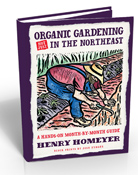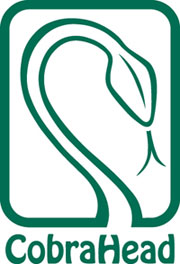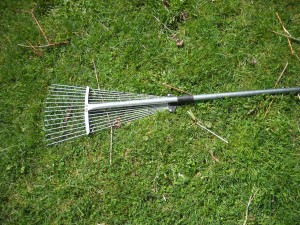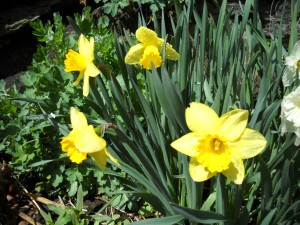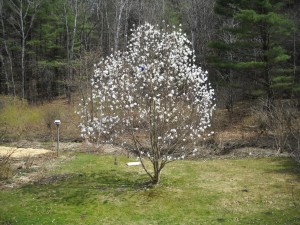Spring Tasks in the Garden
April has been a busy month for most gardeners because it has been warm and sunny. Our flower gardens and trees have woken up early, allowing us to do tasks we might, in other years, put off until May. Here are some jobs I‘ve been working on – and you should be, too.
Raking the lawn. Always one of my least favorite jobs, it needs to be done if you want a good looking lawn. But really, there are only 2 places where it’s critical: First, remove the piles of sand and gravel dumped along the edge of the driveway by the snowplow. Your lawn will suffer if they aren’t removed. Second, harvest the soil pushed up by moles in the lawn. I collect the soil from those piles and use it as fill dirt. The rest of the lawn? Any dead leaves will be chopped up by the lawnmower and disappear – and add some nice organic matter to your lawn’s soil.
Raking the flowerbeds. This I enjoy. I love seeing what plants have come safely through the winter, what is waking up and sending forth shoots. I rake carefully, so as not to break off the growing tips of peonies or other delicate flowers. I start with a rake to clean up around a clump of shoots, and then bend over to gently “rake” the clump itself with my fingers. I use an expanding lawn rake with a telescopic handle. I can adjust the width of the rake from about 7 inches to about 22 inches, allowing me to rake carefully in-between plants. I found the rake locally at my feed-n-grain store.
Pruning. I’m mostly done with this spring task, but I’m still tweaking apple and pear trees as I walk around the property with a holstered pruner on my hip. Recently I cleaned up lots of root suckers –shoots – coming up around the base of a crab apple tree. And I shaped up my roses, cutting back long, lanky stems to create nicely rounded plants.
I just finished pruning my grapes. They need to be cut back severely each year, as they would get too unruly if I didn’t. They produce grapes on new growth, which is stimulated by pruning. I have a 2-wire system on the south side of my barn and prune back to thicker, older canes and the 6-inch spurs that I allow to grow off them.
Planting. At this time of year my garden soil is usually cold and wet. Not so this year. I have planted seeds for carrots, beets, parsnips, scorzonera, salsify (all are root crops), parsley, spinach and greens. Peas could be planted now, though I have decided to skip them this year. I also have transplanted little lettuce plants and other interesting greens that I started indoors at the end of March, including chicory and mesclun. Some folks I know have already planted potatoes, but I wait until June.
I believe (but cannot prove) that planting potatoes in June helps to reduce problems with potato beetles. I like to say they’ve already gone to my neighbors’ potatoes, so avoid mine. But who knows? I watch for the beetles and pick any I find early on, so (hopefully) few produce a second generation.
That same technique works on slugs: control them early to prevent big outbreaks later on. I use an organic slug control product, Sluggo, which is iron phosphate covered with slug bait. Iron phosphate is a naturally occurring mineral that is said to be safe for pets and wildlife – and approved for organic gardeners.
Last fall I neglected to work on my blackberry patch, so I’ve been cleaning it up now, along with help from my intern, Gordon Moore. He cut out all last year’s fruiting canes (which die after bearing fruit). The patch has gotten to be 10 to 12 feet across, so we created a path down the middle of it by pulling out plants as needed. Then we pinned down a 2-foot wide strip of heavy landscape fabric (using landscape staples) and he covered it with a 2-inch layer of chipped branches I got from an arborist.
I weeded the patch and top dressed it with organic fertilizer and other minerals including green sand and Azomite. Green sand provides extra potassium and micronutrients from the sea. Azomite is a brand- named product that contains a wide array of finely ground rocks to provide micronutrients. After adding those minerals, we spread chipped branches around the plants, too.
To keep the blackberries from flopping over when laden with fruit, I have a 2-wire fence on the outside. The lower strand is 30 inches off the ground, the upper is 60 inches. Gordon and I tightened up the fence, which had gotten floppy. Along the center walkway I tied canes to 5-foot grade stakes as needed. It’s a huge improvement! (There’ll be no more need for blood transfusions after picking berries.)
Finally, I spend time right now admiring my flowers. My Merrill magnolia tree has been spectacular and fragrant. Shad bushes, a native plant (Amelanchier spp.), are in full bloom now- both the planted ones and those at the edge of the road and field. All my daffodils – early, mid-season and late – bloomed at the same time this year, so I am picking them and bringing inside to enjoy. I hope you will find time, too, to slow down and enjoy your flowers.
Henry Homeyer is a life-long organic gardener and the author of 4 gardening books. His Web site is www.Gardening-Guy.com

